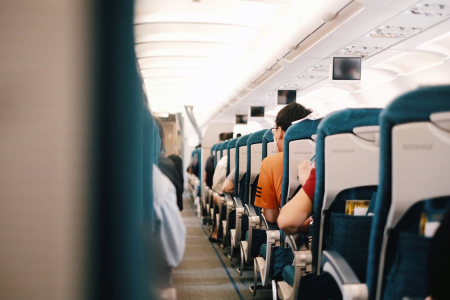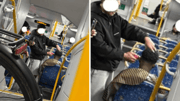What would happen if someone said ‘bomb’ on a plane? One bloke with fake identity just found out
By
Maan
- Replies 0
A Queensland man sparked panic in the skies after allegedly referencing a bomb while onboard a flight.
His words triggered an immediate police response—only for officers to uncover a deeper deception.
What began as an overheard comment quickly unravelled into a case of false identities and federal offences.
The 45-year-old Brisbane resident was fined $1700 after admitting to flying under a false name on two domestic flights.
He appeared at the Downing Centre Local Court in New South Wales on 15 July, pleading guilty to two Commonwealth offences related to using fraudulent identification during air travel.
According to the Australian Federal Police (AFP), the man used false identification details to secure a ticket and board a flight, claiming it was a ‘constitutional flight’.
The situation escalated in January, when the man was reportedly overheard speaking on his mobile phone and making a bomb reference after boarding a Sydney to Brisbane flight.
Police removed him from the plane before departure and launched a full investigation.
A search of the aircraft revealed no explosives, and authorities were unable to substantiate the claim.
It was soon discovered the same man had flown from Hobart to Sydney earlier that day, also using a false name.
Detective Acting Inspector Trevor Robinson warned the public about the broader implications of such behaviour.
‘To ensure the safety of all passengers and crew on aircraft, it’s critical we know who is actually onboard,’ he said.
‘We have seen instances where people use fraudulent identities to evade law enforcement and travel interstate to facilitate criminal activity.’
The AFP said it continued to work closely with airlines to detect security threats and reinforce aviation protocols.
Passengers were reminded of the importance of reporting suspicious activity—especially behaviour involving concealment, erratic movements, or avoidance of screening.
The ‘See it. Hear it. Report it.’ initiative urges the public to notify Airport Watch of concerns by calling 131 237 (131 AFP).
Here’s another case that raised serious questions about air travel safety and how people manage to slip through airport checks.
It’s a reminder that fake identities aren’t just a security risk—they can create major disruptions and trigger widespread concern.
If you found the first story unsettling, this next one offers a deeper look at what authorities are up against.
Read more: Authorities nab one man travelling under a fake identity and more

A single lie at check-in nearly led to airborne chaos—should airlines be doing more to stop identity fraud at the gate?
His words triggered an immediate police response—only for officers to uncover a deeper deception.
What began as an overheard comment quickly unravelled into a case of false identities and federal offences.
The 45-year-old Brisbane resident was fined $1700 after admitting to flying under a false name on two domestic flights.
He appeared at the Downing Centre Local Court in New South Wales on 15 July, pleading guilty to two Commonwealth offences related to using fraudulent identification during air travel.
According to the Australian Federal Police (AFP), the man used false identification details to secure a ticket and board a flight, claiming it was a ‘constitutional flight’.
The situation escalated in January, when the man was reportedly overheard speaking on his mobile phone and making a bomb reference after boarding a Sydney to Brisbane flight.
Police removed him from the plane before departure and launched a full investigation.
A search of the aircraft revealed no explosives, and authorities were unable to substantiate the claim.
It was soon discovered the same man had flown from Hobart to Sydney earlier that day, also using a false name.
Detective Acting Inspector Trevor Robinson warned the public about the broader implications of such behaviour.
‘To ensure the safety of all passengers and crew on aircraft, it’s critical we know who is actually onboard,’ he said.
‘We have seen instances where people use fraudulent identities to evade law enforcement and travel interstate to facilitate criminal activity.’
The AFP said it continued to work closely with airlines to detect security threats and reinforce aviation protocols.
Passengers were reminded of the importance of reporting suspicious activity—especially behaviour involving concealment, erratic movements, or avoidance of screening.
The ‘See it. Hear it. Report it.’ initiative urges the public to notify Airport Watch of concerns by calling 131 237 (131 AFP).
Here’s another case that raised serious questions about air travel safety and how people manage to slip through airport checks.
It’s a reminder that fake identities aren’t just a security risk—they can create major disruptions and trigger widespread concern.
If you found the first story unsettling, this next one offers a deeper look at what authorities are up against.
Read more: Authorities nab one man travelling under a fake identity and more
Key Takeaways
- A man flew under a false name on two domestic flights.
- He was fined $1700 and pleaded guilty to two federal offences.
- He allegedly mentioned a bomb on a flight from Sydney to Brisbane.
- Authorities found no explosives but uncovered his fake identity.
A single lie at check-in nearly led to airborne chaos—should airlines be doing more to stop identity fraud at the gate?








